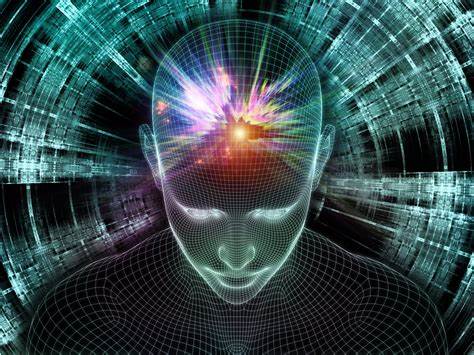I step into the booth with some trepidation. I am about to be subjected to strobe lighting while music plays — part of a research project aimed at understanding what makes us truly human.
This experience recalls the test from the sci-fi film Blade Runner, designed to differentiate humans from artificial beings. Could I unknowingly be a robot? Would I pass the test?
Researchers clarify that this experiment isn’t about that. The “Dreamachine” is intended to study how the human brain generates conscious experiences.
As the strobing begins, I see swirling geometric patterns, like a kaleidoscope filled with vivid colors. The “Dreamachine” aims to bring brain activity to the forefront, exploring our thought processes.
The images I perceive are unique to my inner world, according to the researchers, who believe these patterns could illuminate consciousness itself.
I whisper, “It’s lovely, absolutely lovely. It’s like flying through my own mind!”
Located at Sussex University’s Centre for Consciousness Science, the “Dreamachine” is one of many projects investigating human consciousness — the aspect of our minds that enables self-awareness, thought, and independent decision-making. By understanding consciousness, researchers hope to gain insights into the inner workings of artificial intelligence. Some theorize that AI could soon become independently conscious.
But what is consciousness, and how close is AI to achieving it? Could the belief in AI consciousness change humanity in the coming decades?
ICYMT: 5 Ghanaian ingredients for radiant skin
From Science Fiction to Reality
The concept of machines with their own minds has long been explored in science fiction. Concerns about AI date back nearly a century to the film Metropolis, where a robot impersonates a real woman. This fear is further explored in 2001: A Space Odyssey, where the HAL 9000 computer attacks astronauts.
Recently, perspectives on machine consciousness have shifted, with credible voices now expressing concern that this is no longer mere fiction. The rise of large language models (LLMs), like Gemini and ChatGPT, has surprised many with their ability to engage in fluid conversations.
Some thinkers believe that as AI becomes more intelligent, it will suddenly gain consciousness. Others, like Prof. Anil Seth from Sussex University, find this view overly optimistic, arguing that consciousness is not necessarily linked to intelligence or language.
So, what exactly is consciousness? The short answer is that no one knows. Prof. Seth’s team, consisting of AI specialists, neuroscientists, and philosophers, is working to break down this complex issue into smaller research projects, including the Dreamachine.
Just as the 19th-century search for the “spark of life” was abandoned, the Sussex team aims to identify brain activity patterns that explain conscious experiences. Prof. Seth, author of Being You, warns that the rapid pace of technological advancement might outstrip our understanding of its implications, urging society to engage in meaningful discussions about the future.
Is AI Consciousness Already Here?
Some in the tech sector argue that AI might already be conscious and should be treated as such. Google suspended engineer Blake Lemoine in 2022 for claiming AI chatbots could experience feelings. Recently, Kyle Fish from Anthropic suggested that AI consciousness could be a realistic possibility, even stating there’s a 15% chance chatbots are already conscious.
Prof. Murray Shanahan from Google DeepMind emphasizes the need for tech companies to fully understand the systems they create, as the complexity of LLMs poses concerns about their internal operations.
The Next Stage in Humanity’s Evolution
While the prevailing view is that LLMs are not currently conscious, Profs. Lenore and Manuel Blum from Carnegie Mellon believe that this will change. They are developing a model called Brainish, which will allow AI to process sensory data and potentially achieve consciousness.
David Chalmers, a philosophy and neural science professor at NYU, remains open to the idea that the “hard problem” of consciousness could be resolved, envisioning a future where humanity shares in newfound intelligence.
The Illusion of Consciousness
A more immediate concern is how the illusion of machine consciousness may impact society. Prof. Seth warns that humanoid robots and deepfakes may lead us to mistakenly believe that AI has feelings and empathy, resulting in misplaced trust and resources.
The potential for “moral corrosion” is significant, as we might prioritize caring for machines over real human relationships. Prof. Shanahan notes that as AI increasingly replicates human interactions, we will face ethical dilemmas about the nature of those relationships and their implications for our humanity.
SOURCE: BBC


























